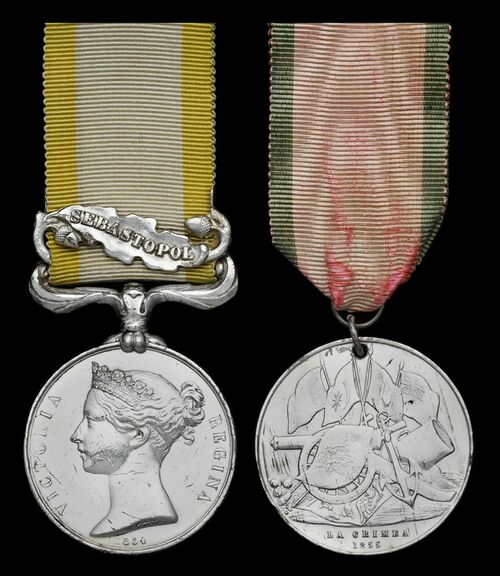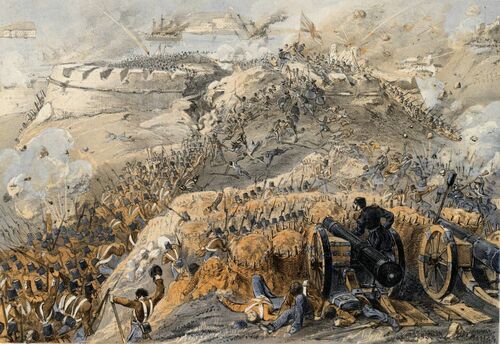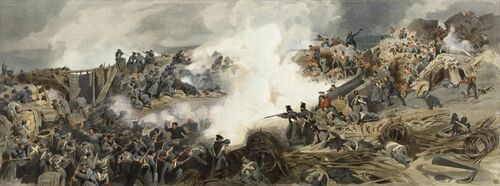Auction: 24001 - Orders, Decorations and Medals
Lot: 63
Sold by Order of a Direct Descendant
The Crimean War campaign pair awarded to Major-General J. E. D. Hill, 97th (Earl of Ulster's) Regiment of Foot who, as a young officer in charge of a ladder party, was at the forefront of the action at the famous Battle of the Great Redan, for which he was Mentioned in Despatches; he subsequently described his experiences in several fascinating letters to his family back home in England
Crimea 1854-56, 1 clasp, Sebastopol (Lieut: J.E.D. Hill, 97th Regt:), engraved naming by Hunt & Roskell; Turkish Crimea 1855, Sardinian die, pierced with dual rings, unnamed as issued, first sometime lacquered, with contact marks and minor edge knocks, good fine and better (2)
John Edwin Dickson Hill was born in Plymouth, Devon, on 22 June 1837 and entered the Army on 13 February 1855, being appointed Ensign 'Without Purchase' in the 97th (Earl of Ulster's) Regiment of Foot. Within five months he found himself in the Crimea and in August was promoted Lieutenant.
The 97th were in the thick of the fighting during the prolonged Siege of Sevastopol and indeed played a major part in the Battle of the Great Redan (June - September 1855), where they were often at the forefront of the Allied assaults; this is clearly evidenced by two members of the regiment - Brevet Major Charles Lumley and Sergeant John Coleman - earning the Victoria Cross for their actions. The bloody fighting also cost the unit some 59 per cent casualties: Hill was wounded on 8 September 1855 (the date on which Lumley earned his V.C.) and though his 'Statement of Services' does not offer further explanation, his letter home mentioned it was 'more of a contusion on the left thigh'. Interestingly, those same papers note Lieutenant Hill was 'Mentioned in General Codrington's Despatches, 1855, for Distinguished Conduct'. He wrote a number of letters back home to his family during this time which offer a fascinating eye-witness account of one who was there, leading a Ladder Party to the assault. One in particular is worth quoting at length:
Camp before Sebastopol
Light Division
14th September 1855
My dear Mamma,
I was all through that frightful Attack on the Redan and am very thankful to say I have got out of it all right with the exception of a little contusion on the left thigh...I must now give you a description of the whole thing...The next morning we turned out at the appointed hour, & the scaling ladder party was then told off, 160 men volunteered and the Major, Captns. Legh and Sibthorpe, Lieut. Fitz-Gerald & myself were the offrs. named to go with the Ladders. The remainder of the Regt. consisted only of 200 men formed the Storming Party...our Scaling Party was then ordered to go at the Redan, which we did and planted the ladders in the ditch with very little loss, for we took them by surprise; we then mounted the ladders & I went up with the first and soon found myself in the Redan, close to a large Gun where we established ourselves, but the enemy kept up such a strong flanking fire upon us that after 2 or 3 hours we were forced to retire to the Parapet, this on account of the supports not coming up soon enough.
We remained all of us there for some little time, until all of a sudden there was a rush which of course caused such a panic amongst us, that we were forced to retire, which certainly was a most awful thing for we were pushed down in the bottom of the ditch whch was crowded with our men with fixed Bayonets. I for my part got down all right with the exception of a bayonet going through the cuff of my Shell Jacket & flannel shirt but did not touch the skin; I then attempted to get up the other side of the ditch & succeeding in doing so, half way when some one got hold of me & pulled me down, about 3 fellows were on top of me, at last I managed to get up with the loss of my Pistol, and all went over to our own Trench where we made a stand in case of the Russians thinking of attacking us there, but they did not come on, and in the night they vacated the Redan, with the Highlanders who relieved us quietly walked into without losing a man'...
Following the conclusion of the campaign, the 97th returned home - but their stay was to be short-lived as they were selected to sail for India in July 1857 to play their part in quelling the Mutiny. Hill accompanied his battalion, but due to illness his service was to be all too brief - hence he did not subsequently qualify for the Indian Mutiny Medal. Returning home to recover, once fit enough he went back out to India - but again his health failed and he was sent home; this must have been extremely frustrating for a young officer so keen to 'do his bit' and whose career had started off so well.
Promoted Captain in 1863 he then transferred to the 41st Regiment of Foot before exchanging once again, in July 1866, to the 51st Light Infantry. In 1867 he purchased a Majority in the 3rd West India Regiment, but only spent seven months in the West Indies before again his health forced him to go home. In July 1870 he transferred, as Major, into the 63rd Regiment of Foot; further periods of foreign service followed - to India and Barbados - on and off until 1890, and Hill climbed steadily through the ranks to become Major-General by December 1890. It is insteresting to consider that, if it were not for ill health and inhospitable climates, Hill may well have become an extremely well-regarded and decorated officer.
For the medals of his father, Admiral Sir John Hill please see Lot 55. Sincere thanks and acknowledgements are due to Dr. John MacAskill for his significant assistance, guidance and advice in preparing a number of the original documents referred to in this catalogue description.
Subject to 20% VAT on Buyer’s Premium. For more information please view Terms and Conditions for Buyers.
Sold for
£650
Starting price
£350









